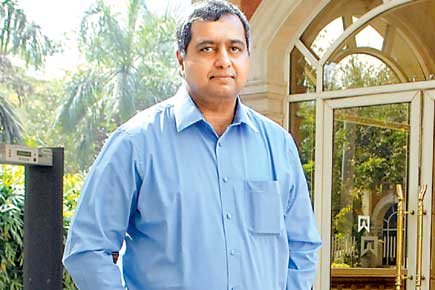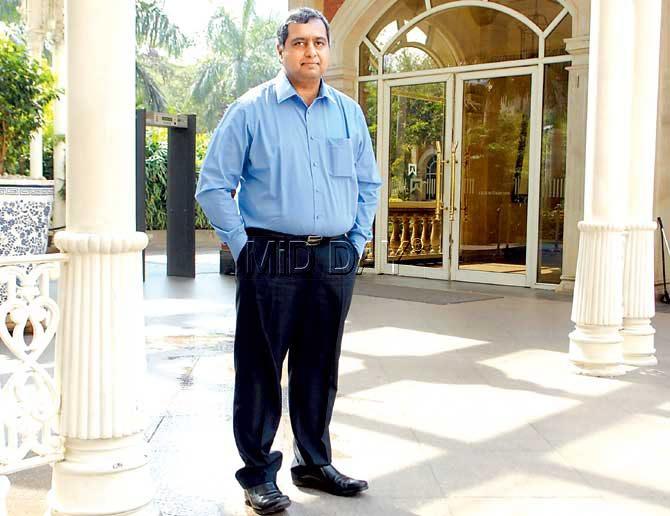Gautam Padmanabhan tells Kareena Gianani why Indian publishing has never seen better days, and what it takes to lure and nurture Tripathi and Ashwin Sanghi

Gautam Padmanabhan, CEO at Westland Ltd, at the ITC Grand Central hotel, Parel
Gautam Padmanabhan, CEO, Westland Ltd
It isn't very surprising when Gautam Padmanabhan, CEO of Westland Ltd, tells us that one of his fondest childhood memories involves a large carton of books, that new-book fragrance wafting through the brown paper wrapping, and his then-11-year-old self tearing the consignment apart to find Agatha Christies, Alistair MacLeans and other thrillers inside.
Gautam Padmanabhan, CEO at Westland Ltd, at the ITC Grand Central hotel, Parel. Pic/Shadab Khan
"Books ran in my family; I don't remember my childhood without them. My father had set up East West Books in 1962 in Delhi, and the company distributed science and business books — they were called general books back then. In the 1960s, after the IITs were set up, American publishers got subsidies and that brought the first wave of McGraw Hill and the likes to India," Padmanabhan's own interest in selling books, however, peaked only after his father began dealing in general books in the early '80s. "I remember telling my father that I wanted to work with books. I was only a teenager then," he smiles.
Into books and music
Padmanabhan's father, of course, turned him down. The family had moved to Chennai in 1975 and Padmanabhan began studying at the University of Madras in 1987. Padmanabhan, who was a single child, continued to be occupied by books but also developed a keen love for music. "I was a John Lennon fan and loved the Beatles and other classic rock music. I'd say my taste was eclectic and it was further developed in college, because we had a great music scene."
It was by sheer serendipity that Padmanabhan was introduced to a sport which would come to enthrall him in the coming years — quizzing. "A friend's brother was a gifted quizmaster, and after he introduced me to it, I collaborated with him as quizmaster on the Landmark Quiz (also called the Open Quiz in Chennai) between 1988 and 2000," he says. He also co-authored several Penguin Landmark Quiz books with his mentor or sorts.
Like any other sport, emphasises Padmanabhan, the more you immerse yourself in quizzing, the better you get. "Winning a quiz is not about knowing it all. It is about having a knack of knowing what you will quizzed on. It is about reading the quizmaster's mind and knowing his interests in and out."
Once, Padmanabhan designed a question which required a contestant to guess what was common to the Rajinikath film, Baba, and the visual cue of Jimi Hendrix at Woodstock. The answer: Baba was inspired by Rajinikanth's spiritual guru, Swami Satchitananda, who had also delivered a memorable speech at the Woodstock Festival in 1969, (it was the festival's first edition at New York). At another instance, the publisher asked a contestant to guess how the Rishi Kapoor directorial debut, Aa Ab Laut Chalein and the 1965 classic, The Sound of Music, were connection.
Is there a connection, really? "Of course!" says Padmanabhan. "In the Hindi film, one of the scenes was shot at the Trapp Family Lodge in Vermont, USA," he chuckles.
The bigger questions
Quizzing was such a large part of Padmanabhan's personality that he believes it held him in good stead even at work, as a publisher. "In 2001, when the tsunami hit the subcontinent, I remember reading about a book by William Manchester, based on a similar incident in the island of Krakatoa in 1883. A volcano had exploded and it had an impact across the world, dark clouds had spread till France. I was part of Westland then, and immediately imported the book because I thought readers would be interested, and they were. Had I not come across this fact during quizzing, I would have never taken that decision."
Lest one feels quizzing is all fun and games, Padmanabhan offers a word of caution. The very credibility of a quiz depends on its quizmaster, he points out. "Imagine getting a question wrong when big money is riding on it." He remembers the show, Koteeswaran, the Tamil equivalent of the popular quiz show, Kaun Banega Crorepati. Padmanabhan worked as research assistant on the show and formulated a question based on the fact that Tranquebar was a Danish settlement. The Tamil Nadu tourism board, however, complained soon after, claiming it was a Dutch colony.
"They were wrong, but it tells you how a quizmaster cannot rely even on so-called official sources of information. In another instance, we got a question wrong – it was about the birthplace of superstar Sivaji Ganesan. I had researched the Oxford University Press's Encyclopedia on Cinema, which they release in association with the British Film Institute. Even they had got it wrong! So, you really have to be careful how keenly you crosscheck your sources," says Padmanabhan.
Publishing in India
The publishing scene in India, says Padmanabhan, truly changed when Penguin arrived in 1987, and when Hemu Ramaiah set up India's first Landmark store at Chennai in the same year. "I still remember that sprawling, 5,000 sq feet space — no one thought it would work!" chuckles Padmanabhan. "But Hemu believed her dream. My father supported the store and it was a success," adds the publisher.
Padmanabhan remembers how in the '80s and '90s, when it came to publishing, India was "West-looking" and most people who read in English were into bestsellers such as Enid Blyton (for children) and Agatha Christie (for adults), but that was about it. The rest consumed literary fiction from the UK.
"The first wave of Indian writing in English was brought in by authors like Salman Rushdie, but our tastes were largely dictated by the West. We looked up to the books on the Time's bestseller list, simply because we didn't have a bestseller list of our own," says Padmanabhan. Not many American publishers had stepped upon the Indian soil yet because few had visited the country often enough to publish their titles here.
Expanding horizons
Padmanabhan's own world truly merged with the larger, more imaginative world of publishing only after he attended a book expo at Los Angeles in 1994. "Jeff Bezos (founder of Amazon.com) was there, too. It was a whole new world, with books unlike any I had seen before. There were publishers we knew, but titles we had never had in India," says Padmanabhan, the awe palpable in his voice even today.
In 1996, East West Publishing and Landmark joined hands and Westland was born (it was only in 2005 that the Tata group invested in landmark, bought over East West Publishing and merged them). Today, at Westland Ltd, Padmanabhan knows better than to indulge his personal tastes in the books he publishes. "My preferences, market-driven manuscripts, previous records — they all belong outside the door when I decide to publish a book. I read as the reader does, and readers don't care about these things. They care only about the book they hold in their hands."
Padmanabhan considers it quite an achievement to have imported then offbeat graphic novels to India for the first time. "Apart from DC and Marvel comics, Westland imported The Dark Knight, Maus and Persepolis, which only had US editions. Even their UK editions came much later," he remembers.
Luring Anuja Chauhan
At the moment, Westland Ltd is basking in the glory of having lured bestselling author Anuja Chauhan to their camp. "Essentially, it all boils down to whether a publisher can deliver the marketing-related promises s/he makes to a bestselling author, which we did." The publisher's philosophy at Westland today is to publish fewer titles as compared to other publishers, but market them aggressively. "We publishers in India are yet to crack the distribution and marketing success formulae, and I think this is one way to do it," feels Padmanabhan. The true game-changer in the publishing industry, he feels, would be how publishers exploit non-traditional outlets to sell books.
Padmanabhan defines his leadership style as one which trusts people to fulfil their roles in a flat organisational structure. "I extend the same openness to Westland's authors, and I find that it works." He is also quite dismissive of fancy degrees and feels they don't always matter. "Look at me — I got into publishing after a Bachelors degree in commerce. I didn't chase an MBA degree because they can be quite the con job. What truly matters is your passion for your work."
When Padmanabhan isn't thinking books, he spends time with his wife and 10-year-old son, who he says has taken love for music to a level higher than Padmanabhan ever did — he learns the guitar and the piano and has been taken with the Beatles after attending a tribute concert on the greats. "My wife grumbles about how my musical gene passed on to our son, but not her love for wildlife photography," chuckles Padmanabhan.
 Subscribe today by clicking the link and stay updated with the latest news!" Click here!
Subscribe today by clicking the link and stay updated with the latest news!" Click here!









